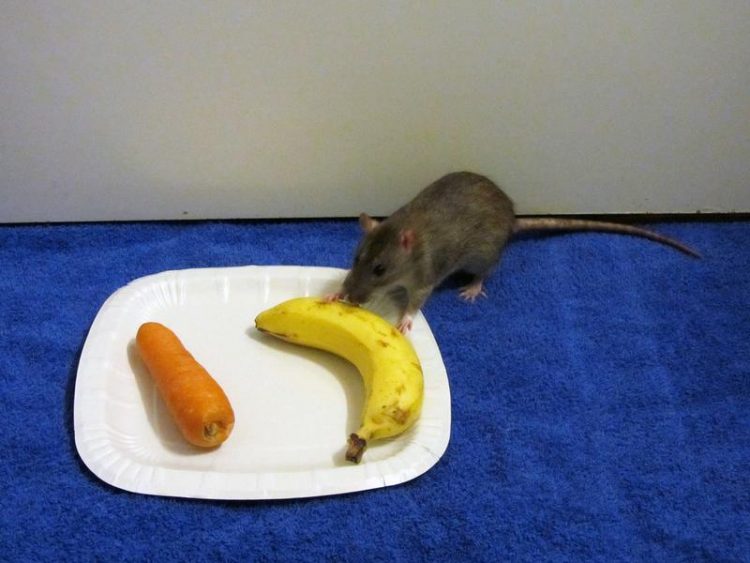Norway rats reciprocate help according to the quality of the help they received

Rats provided by a social partner with attractive food, such as a banana, return this favour more readily than if the previous reward was rather unappealing, such as a carrot. Vassilissa Dolivo
Reciprocal exchange of services and commodities among conspecifics is common, and has been observed for instance in primates, vampire bats and rats. For humans, a predominant factor influencing the motivation to reciprocate help is the individual’s perceived benefit resulting from the value of received help.
Hitherto, it was unclear whether outside of humans the value of a received reward may affect the decision to cooperate reciprocally, independently of other parameters such as the partner’s identity or it’s furnished effort.
Using Norway rats, Vassilissa Dolivo and Michael Taborsky, two researchers at the Institute of Ecology and Evolution from the University of Bern, have found that animals other than humans also reciprocate help according to the quality of help they received.
The study appeared in the journal «Biology Letters». According to Vassilissa Dolivo, Norway rats were chosen because of their ability to perform experimental tasks under laboratory conditions, as of their high degree of sociality in the wild and their known ability to cooperate on the basis of the decision rule of direct reciprocity – that is «helping someone who has helped you before».
Banana providers preferred
Twenty female wild-type Norway rats were tested in a variant of the prisoner’s dilemma paradigm. Each test rat received food items differing in value and attractiveness from two different social partners that provided either a preferred, «high quality» reward – pieces of banana – or a less relished, «low quality» reward – pieces of carrot. The quality of the offered food was the only variable parameter for test rats to distinguish between different cooperators.
Subsequently, the test rats could decide to provide their previous banana or carrot providers with oat flakes. «The test rats showed a clear preference to pay back help to the partner that had provided them with the preferred food», says Michael Taborsky. «They helped previous banana providers much quicker than previous carrot providers.»
According to the authors, these results demonstrate that animals can consider the value of previously received help when deciding whether to help a social partner. This may have important implications for our understanding of reciprocal cooperation in nature, for which, as Vassilissa Dolivo points out, «evidence is increasing throughout vertebrates, from fishes to primates».
http://www.kommunikation.unibe.ch/content/medien/medienmitteilungen/news/2015/he…
Media Contact
All latest news from the category: Life Sciences and Chemistry
Articles and reports from the Life Sciences and chemistry area deal with applied and basic research into modern biology, chemistry and human medicine.
Valuable information can be found on a range of life sciences fields including bacteriology, biochemistry, bionics, bioinformatics, biophysics, biotechnology, genetics, geobotany, human biology, marine biology, microbiology, molecular biology, cellular biology, zoology, bioinorganic chemistry, microchemistry and environmental chemistry.
Newest articles

Combatting disruptive ‘noise’ in quantum communication
In a significant milestone for quantum communication technology, an experiment has demonstrated how networks can be leveraged to combat disruptive ‘noise’ in quantum communications. The international effort led by researchers…

Stretchable quantum dot display
Intrinsically stretchable quantum dot-based light-emitting diodes achieved record-breaking performance. A team of South Korean scientists led by Professor KIM Dae-Hyeong of the Center for Nanoparticle Research within the Institute for…

Internet can achieve quantum speed with light saved as sound
Researchers at the University of Copenhagen’s Niels Bohr Institute have developed a new way to create quantum memory: A small drum can store data sent with light in its sonic…





















